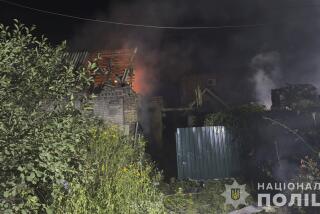Troops withdrawn from Iraq, Turkey says
- Share via
BAGHDAD — Turkey announced Friday that it had pulled its troops out of northern Iraq, concluding a large-scale offensive against Kurdish separatist guerrillas that has strained relations between two U.S. allies.
A statement by the Turkish military command said the weeklong operation had achieved its goals by denying militants from the Kurdistan Workers Party, known as the PKK, a permanent and secure base in the mountainous border region from which the rebels could launch attacks on Turkish territory.
“It is out of the question that the terrorist organization is entirely eliminated with one regional operation,” the Turkish command said on its website. “However, it has been shown to the organization that the north of Iraq is not a safe place for terrorists.”
Iraq’s foreign minister, Hoshyar Zebari, confirmed the Turkish troops had left.
“As of this morning, 4 a.m., the Turkish troops who entered Kurdish territory have withdrawn and gone back to their side of the border,” Zebari told The Times by telephone. “This is good news; we welcome that.”
However, PKK spokesman Ahmed Denis disputed that there had been a complete withdrawal. While he agreed that Turkish troops had left the Zab area, the focus of some of the most intense clashes in recent days, he said some remained in other places.
“Until this moment there are two military units, about 200 Turkish soldiers, which are trapped and in the range of fire of the PKK,” Denis said. “Thirteen of them were killed since last night.”
U.S. and Iraqi officials had urged Turkey to wrap up its operation as quickly as possible, a message reiterated Thursday by U.S. Defense Secretary Robert M. Gates during a visit to Ankara, the Turkish capital. However, the statement from the Turkish General Staff said the decision to pull out was based solely on an assessment of military needs, not international pressure.
“No internal or external influences were a factor in this decision,” it said.
A State Department spokesman said the U.S. was pleased that Turkey had adhered to its commitment to keep the operation “limited in scope and duration.”
“The important thing, though, is that the PKK is and remains a problem for Turkey, for the United States and for Iraq,” spokesman Tom Casey said. “What we want to do is continue to work with the government of Turkey, as well as the government of Iraq, to be able to resolve it and put an end to the threat that it poses to all of us.”
Thousands of Turkish troops, backed by warplanes and artillery, crossed into northern Iraq on Feb. 21 in pursuit of the Kurdish rebels, who have been fighting since 1984 for an independent homeland in southeastern Turkey.
The incursion put the U.S. in an awkward position as it tried to balance the security needs of Turkey, a North Atlantic Treaty Organization ally, against concerns a large-scale military operation could destabilize the relatively peaceful semiautonomous Kurdish region in northern Iraq.
Washington regards the PKK as a terrorist group and has said that Turkey has a right to defend itself. U.S. officials have pressed Baghdad to do more to help crack down on the PKK and have supplied intelligence to Turkey about the group’s activities in Iraq.
But the offensive, Turkey’s largest incursion in years, angered Iraqi officials, who called it a violation of sovereignty.
“We believe that there are other ways to address the PKK issue,” said Zebari, a Kurd.
The Turkish military said it had “eliminated” 240 militants during the offensive, and said 24 Turkish soldiers and three village guards had been killed in the operation.
The militants say they have killed at least 100 Turkish soldiers but have not provided a figure for their own dead.
--
--
Times staff writer Zavis reported from Baghdad and special correspondent Comert from Istanbul, Turkey. Special correspondent Asso Ahmed in Sulaymaniya, Iraq, contributed to this report.
More to Read
Sign up for Essential California
The most important California stories and recommendations in your inbox every morning.
You may occasionally receive promotional content from the Los Angeles Times.










